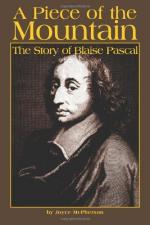|
This section contains 2,088 words (approx. 7 pages at 300 words per page) |

|
PASCAL, BLAISE (1623–1662), French mathematician, religious thinker, and philosopher, was one of the greatest minds in modern intellectual history. He was educated at home by his father, Étienne, who, when living in Paris from 1631 to 1639, belonged to the society of scientists organized by Mersenne. A precocious genius, Pascal in 1639 wrote a mathematical work of which a part, Essai sur les coniques, has been preserved and published. From 1642 to 1644, when in Normandy with his father, he constructed a calculating machine. His mathematical and physical works include a treatise, based on experiments, disproving the theory of the impossibility of vacuum, as well as works on cycloids and on the theory of probability.
Jansenism
In Normandy Pascal was in touch with priests who were disciples of the Abbé of Saint-Cyran, and in 1646 he went through a religious conversion, but he neither abandoned his scientific work nor renounced mundane life. However...
|
This section contains 2,088 words (approx. 7 pages at 300 words per page) |

|


